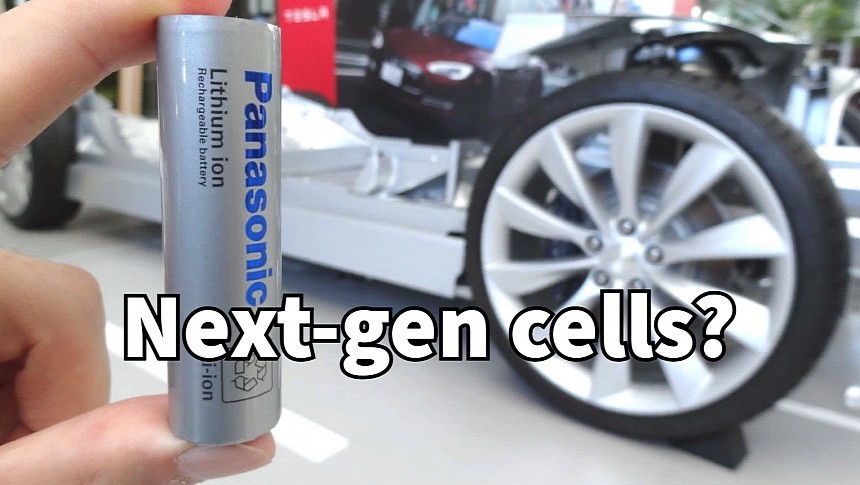Panasonic plans to start production of an improved version of its 2170 cells for Tesla between 2024 and 2025. Still, this might not be the breakthrough Tesla fans hoped for, with only modest improvements over current cells coming from the Nevada plant.
Tesla has always been considered a pioneer in Li-ion batteries thanks to its extensive research in improving the chemistry and performance of battery cells. Tesla indeed invested in many battery-related technologies and has signed partnerships with universities and laboratories. However, Li-ion batteries proved stubborn, and many bets Tesla made in the past years have yet to show any meaningful results.
Tesla's new 4680 battery cells, first unveiled in 2020 during Battery Day, are probably the most famous. Presented as the holy grail of Li-ion technology, the 4680 cells promised to bring significant improvements in energy density, power, and costs compared to the 2170 cells. The use of a silicone anode and dry battery electrode (DBE) technology would bring these advancements within grasp. Unfortunately, both are still works in progress, making the 4680 cells just bigger cells with worse thermal characteristics.
The 4680 failure is forcing Tesla to reconsider 2170 cells, which is why it counts on its battery partners more than ever. With all its efforts put into cracking 4680 cells, it's up to partners like Panasonic to quench its 2170 battery cell thirst. The Japanese manufacturer is trying to do just that by building a new 2170-only factory in Kansas and considering options for a third US factory. A recent report by Bloomberg claims that Panasonic is also planning a revamped 2170-cell version.
That was enough for some news outlets to speculate that the new battery cells will make Tesla EVs better and cheaper. The report is based on an interview with Shoichiro Watanabe, Panasonic's Chief Technology Officer for EV batteries. However, Watanabe's words may not point to as big of a change as Tesla fans might have hoped for. As you can see in the interview linked below, the improvement in energy density only amounts to 5%. It's still an improvement, but not the kind of breakthrough some media headlines promised.
More specifically, Watanabe says that Panasonic plans to increase installed capacity at its Nevada plant (jointly operated with Tesla) by 10%. This will be achieved not by adding production lines but by increasing battery capacity (basically energy density) and manufacturing efficiency by 5% each. This is a modest improvement that doesn't sound like a new generation of cells but rather like an incremental change.
Panasonic is still aiming to quadruple its production capacity in the US, from 50 GWh to 200 GWh, by 2030. The Japanese manufacturer is building its second US factory in Kansas, where it will produce 2170 cells exclusively. Plans for a third factory have been put on hold for now, although Panasonic is still evaluating before making a decision. My understanding is that the third factory (initially planned in Oklahoma) was for 4680 cells. Without either Tesla or Panasonic making progress with the bigger cells, the Japanese company decided to wait before making a decision.
Tesla's new 4680 battery cells, first unveiled in 2020 during Battery Day, are probably the most famous. Presented as the holy grail of Li-ion technology, the 4680 cells promised to bring significant improvements in energy density, power, and costs compared to the 2170 cells. The use of a silicone anode and dry battery electrode (DBE) technology would bring these advancements within grasp. Unfortunately, both are still works in progress, making the 4680 cells just bigger cells with worse thermal characteristics.
The 4680 failure is forcing Tesla to reconsider 2170 cells, which is why it counts on its battery partners more than ever. With all its efforts put into cracking 4680 cells, it's up to partners like Panasonic to quench its 2170 battery cell thirst. The Japanese manufacturer is trying to do just that by building a new 2170-only factory in Kansas and considering options for a third US factory. A recent report by Bloomberg claims that Panasonic is also planning a revamped 2170-cell version.
That was enough for some news outlets to speculate that the new battery cells will make Tesla EVs better and cheaper. The report is based on an interview with Shoichiro Watanabe, Panasonic's Chief Technology Officer for EV batteries. However, Watanabe's words may not point to as big of a change as Tesla fans might have hoped for. As you can see in the interview linked below, the improvement in energy density only amounts to 5%. It's still an improvement, but not the kind of breakthrough some media headlines promised.
More specifically, Watanabe says that Panasonic plans to increase installed capacity at its Nevada plant (jointly operated with Tesla) by 10%. This will be achieved not by adding production lines but by increasing battery capacity (basically energy density) and manufacturing efficiency by 5% each. This is a modest improvement that doesn't sound like a new generation of cells but rather like an incremental change.
Panasonic is still aiming to quadruple its production capacity in the US, from 50 GWh to 200 GWh, by 2030. The Japanese manufacturer is building its second US factory in Kansas, where it will produce 2170 cells exclusively. Plans for a third factory have been put on hold for now, although Panasonic is still evaluating before making a decision. My understanding is that the third factory (initially planned in Oklahoma) was for 4680 cells. Without either Tesla or Panasonic making progress with the bigger cells, the Japanese company decided to wait before making a decision.










